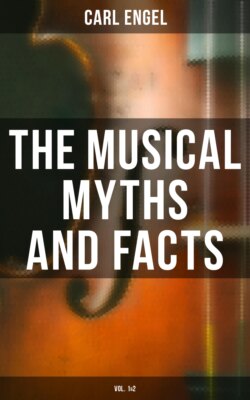Читать книгу The Musical Myths and Facts (Vol. 1&2) - Engel Carl - Страница 14
На сайте Литреса книга снята с продажи.
AL-FARABI.
ОглавлениеTable of Contents
Most of the popular legends and fairy tales which have been traditionally preserved are of high origin. Many of those which appear to have originated during the Christian era are only modifications of older ones dating from heathen times. Thus, we find the Virgin Mary in a legend substituted for a pagan goddess, and one or other Saint for a pagan god. Sometimes a remarkable incident, recorded in ancient history, is related as having occurred at a much more recent time. Perhaps it may have happened again, but in many cases the old tradition has, undoubtedly, been borrowed by one nation from another, and has been adapted to circumstances which favoured its adaptation.
In the musical records of the Arabs mention is made of the wonderful accomplishments of a celebrated musician, whose name was Al-Farabi, and who acquired his proficiency in Spain, in one of the schools at Cordova, which flourished as early as towards the end of the ninth century. The reputation of Al-Farabi became so great, that ultimately it extended to Asia. The mighty Caliph of Bagdad himself desired to hear the celebrated musician, and sent messengers to Spain with instructions to offer rich presents to Al-Farabi, and to convey him to the Caliph's court; but the musician feared that if he went he should be detained in Asia, and should never again see his home, to which he felt deeply attached. However, at last he resolved to disguise himself, and to undertake the journey, which promised him a rich harvest. Dressed in a mean costume he made, unrecognized, his appearance at the court just at the time when the mighty Caliph was being entertained with his daily concert. Al-Farabi, unknown to everyone present, was permitted to exhibit his skill. He sang, accompanying himself on the lute. Scarcely had he commenced his performance in a certain musical mode when he set all his audience laughing aloud, notwithstanding the efforts of the courtiers to suppress so unbecoming an exhibition of mirth in the presence of the mighty Caliph. In truth, even the mighty Caliph himself was compelled to burst out into a fit of laughter. Presently, Al-Farabi changed to another mode, and the effect was that immediately all his hearers began to sigh, and soon tears of sadness replaced the previous tears of mirth. Again he sang and played in another mode, which excited his audience to such a rage that they would have fought each other if he, seeing the danger, had not directly gone over to an appeasing mode. After this wonderful exhibition of his skill, he concluded in a mode which had the extraordinary effect of making his listeners fall into a profound sleep, during which Al-Farabi took his departure.
It will be seen that this incident is almost identical with one recorded as having happened about twelve hundred years earlier at the court of Alexander the Great, and which forms the subject of Dryden's fine poem, 'Alexander's Feast.' The distinguished flutist, Timotheus, playing before Alexander, successively aroused and subdued different passions by changing the musical modes during the performance, exactly in the same way as did Al-Farabi more than a thousand years later.
